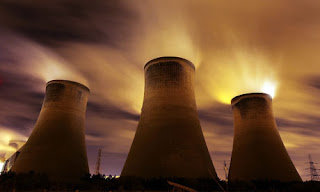"...no place on the global balance sheet for ecosystems and civilisation"
 Sadly, coal may have been the biggest winner coming out of the Copenhagen Climate Summit. With governments failing miserably to demonstrate leadership in forging our energy future, coal industry leaders have slipped into to fill the vacuum.
Sadly, coal may have been the biggest winner coming out of the Copenhagen Climate Summit. With governments failing miserably to demonstrate leadership in forging our energy future, coal industry leaders have slipped into to fill the vacuum.Don't hold your breath waiting for courage or vision from them. (GW)
Investing in coal is dysfunctional
By Jeremy Leggett
The Guardian
December 30, 2009
The acid test of the Copenhagen climate change summit was always going to be coal. Had governments managed to come up with a meaningful agreement, those who seek to continue burning coal would have faced significant risk that they would be spending their money on what investors call "strandable" assets – assets that become obsolete and therefore worthless. And for their part, financial institutions would have had to think twice whether they should keep pouring billions of dollars into new coal-fired electricity generation, seeking short-term returns while knowingly fuelling future climate ruin that is not costed in today's books.
But there was no meaningful agreement. And so we see the first in the queue to foist coal horrors upon us already knocking at the door. Since Copenhagen, E.ON has announced that any further emissions cuts by the company will depend on governments making progress in 2010 in the climate negotiations. E.ON and Centrica have both said they are less likely to build coal plants attempting carbon capture and storage. We can expect to see similar sentiments from most of the other big energy companies. Enlightened business leadership ahead of legislation is not their bag. More plans for unsequestered coal, without trapping and burying the carbon dioxide, will be the best we can expect.
To be fair to the power companies, the fault is wider. Most investors expect this behaviour of them. Most banks, insurance companies and pension funds are happy, as things stand, to continue investing in coal.
When it comes to the London Stock Exchange, they will have their first major chance soon. The largest Russian steam coal producer is eyeing an initial public offering in London during the first half of 2010. Suek, owned by two oligarchs, is worth $8-9bn (£5-6bn), and will be floating as many as a quarter of its shares. As one anonymous banker put it to Reuters: "There haven't been any good opportunities in this sector for a long time, and the sector is on its way up, so therefore this will be a positive story."
Of course, at the same time, those buying shares will be fuelling long-term wealth destruction – let me not be so base as to mention killing people to boot, let's stick to the money – by stoking climate change. This is the bottom line with the dysfunctional form of capitalism we have allowed to evolve. And the most galling thing is this: the bonus cultists are doing it, in large part, with our money.
A pension fund manager invests billions built up from tiny parcels of the peoples' pension contributions. He is rewarded, like everyone else in the temples of finance, on the basis of short-term returns. That the pension holder might retire into a world that is increasingly unliveable because of the actions of his fund manager features nowhere in any bonus calculation.
Hugo Chávez gloatingly told the Copenhagen summit that capitalism is to blame for climate change. He has more than half a point. After this failure of a summit many leaders had cast as a last-chance saloon, surely now we have to think hard about capitalism in the form we have allowed it to evolve.
The fact is that as things stand – to use the parlance of the investment bankers who will scrabble to win the Russian coal business and the pension fund managers who will line up to invest in the listing – there is no place on the global balance sheet for the assets most relevant to the survival of economies: ecosystems and civilisation. There is plenty of space for spectres they label as assets while shovelling the attendant megarisks off the books. That is the real bottom line.
Unless, that is, we can mobilise enough people-power, on enough fronts, for the citizenry to turn around the course of a war in which our leaders are currently displaying toothless impotence. The listing by Suek, and the role of our money it, might be a good place to start.
Any company investing in that IPO is a company that I will no longer bank or insure with. And any pension fund investing in it is one that I will encourage all my friends to switch their pension out of.
Jeremy Leggett, jeremyleggett.net, set up his company, Solarcentury, to fight climate change.

0 Comments:
Post a Comment
<< Home